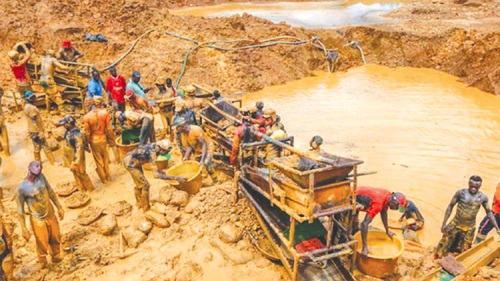
Sustaining fight against galamsey inevitable mandate
The accusations and counter-accusations between some members of the New Patriotic Party (NPP) and the government on one hand, and a former Minister of Science, Environment, Technology and Innovation, Prof. Kwabena Frimpong Boateng, on the other hand, have raised concerns beyond partisan politics.
Advertisement
From the rational choice perspective of politics, the American political scientist and communications theorist, Harold Dwight Lasswell, claim that politics is about who gets what, when and how, which is pivotal in our understanding of the ‘galamsey’ tussle among the parties involved.
The public defence mounted by those accused by the former minister is equally in sync with the Hobbesian concept of the state of nature where politics is grounded in the individual's desire to preserve his life and his goods, and when in government the role is to serve these ends.
Beyond partisanship is a more serious issue of the environment, which is the focus of this piece. The devastating impact on the environment and the effect on climate and farming, which many people depend on in mining areas, are some critical issues that ought to be considered in the galamsey discourse.
Impact of illegal mining
Illegal mining has a very serious environmental impact that affects everyone living in Ghana. Apart from the devastating effect on the soil, water contamination, air pollution, and the destruction of the ecosystem, galamsey endangers wildlife and human health. Besides, the activities of illegal miners have the potential to cause irreparable harm to the local population which can lead to health and safety issues, economic losses and social disruption.
Climate change
Another serious issue of essence to human life is the global clamour to do something about climate change. Illegal mining, popularly known as galamsey, can have a wide range of impacts on the climate, including air pollution, greenhouse gas emissions and deforestation.
For instance, burning coal or other fuels to power unlicensed mining operations can result in increased emissions of pollutants such as sulfur dioxide, carbon dioxide, and nitrogen oxide, which science has convinced us that they are major contributors to the negative impact of climate change. Also, deforestation caused by activities of illegal mining can also exacerbate climate change. This may be due to the basic knowledge from all levels of our education system that trees help absorb carbon dioxide from the atmosphere.
Effect on farming
Agriculture remains the mainstay of the Ghanaian economy. As such, we must do everything to safeguard this sector. Already, the effect of bushfires has destroyed large tracts of farmlands across the country contributing to food shortages and culminating in higher prices. Illegal mining can also harm farming. For example, the activities of these miners can pollute water sources used for irrigation and contaminate soil used to grow crops.
Illegal mining can also destroy natural habitats, leading to the displacement of wildlife, which disrupts the natural balance of the ecosystem. Also, illegal mining can lead to economic hardship, as it can lead to increased taxes and reduced job opportunities, which may mean fewer resources available to farmers. Mining in general can cause the above effects. However, regulated miners can be tracked and those who failed to do proper reclamation may stand the chance of having their licences revoked. But the illegal miners are on the free fall to the destruction of the land with impunity and must be brought to order.
The way forward
History is replete with examples of how countries have adopted a variety of remedies to address illegal mining. We may not need to reinvent the wheel if we are committed to this fight. Some of these include the strengthening of existing legal frameworks, alternative livelihood for the young men engaged in it, deterrent penalties for offenders and even incentivising responsible mining practices. Perhaps, the less difficult tasks that can help reduce illegal mining activities include raising public awareness on the life-threatening impact of destroying water bodies, sustained community engagement in monitoring illegal activities and exploring innovative political-willed state-led operations to end the canker.
The state of Ghana’s fight against illegal mining at this stage is that of hopelessness but looking on while the politicians engage in accusation and counter-accusation, while the destruction goes on, is to place the fate of generations unborn in danger.
Let us see the galamsey fight mess we find ourselves in as a destined thing aimed at exposing our hypocrisy, greed, as well as recklessness and from it learn a bitter lesson that will inform and shape strategies for the next phase of the real battle against all forms of destruction to our water bodies. Let us all get involved because the destroyers may be few but the impact of their activities will affect all of us today and the unborn.
The writer is a lecturer at the Department of Political Science Education
University of Education, Winneba.



